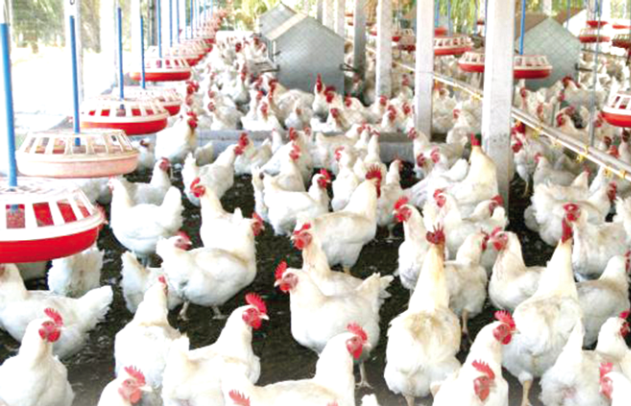A lecturer in agricbusiness economist has advised the government of Ghana to channel the revenues accrued from the 35 per cent import tariff that has been slapped on imported chicken into a fund that will support the poultry industry in the country.
Professor Vincent Amanor-Boadu who is an Agricbusiness Economics and Management Lecturer at the Kansas State University, said tariffs that are meant to prevent or reduce imports were not very useful unless they were channeled into a special fund to support that particular industry.
He said this when he presented a study on the structure of Ghana’s chicken industry in 2015.
Ghana's imports of chicken meat have been increasing over the past several years.
This has been attributed to improving economic wellbeing of Ghanaians, a changing diet that includes a higher proportion of animal protein and an increasing demand for convenience.
There has been concern that these imports are adversely affecting domestic producers.
This trend is not limited to Ghana, but has been seen across West African, leading to the imposition of a Common External Tariff on chicken meat imports across the sub-region in an attempt to support domestic production.
Professor Amano-Boadu however said he did not foresee any major changes in the poultry industry because the tariffs were going into general revenue, with no new investment going into poultry.
Demand for processed chicken
He said his study showed that the influx of imported chicken in the country was due to the inability of the local market to meet the demand.
“The country has an overwhelmingly small production system whiles demand is increasing rapidly and cannot be met, and yet government policies are looking at the problem as an export problem, slapping taxes on imports that are coming in when there is no domestic production,” he stated.
He said the demand however was for processed chicken and not live birds, therefore urging local poultry farmers to produce for what the market is demanding.
“The Ghanaian poultry industry is not producing what the customers demand so you can raise the price of imported chicken but if that is the only place consumers can get it, then they will still get it,” he noted.
He said production at the local level, therefore, had to change and modernized to realize that the market has changed and the demand was for processed chicken.
“There should be an awakening that yes there are birds out there but the birds are in the wrong form for the market,” he pointed out.
He said the tariffs form the imported chicken should therefore be channeled into programmes and policies that would boost the capacity of those in the industry to move into processing, rather than sell the birds live.
“The government has a choice of saying that: this tariff is for the poultry industry and we are going to invest it to enhance the competitiveness of the poultry industry instead of putting it in the general revenue,” he noted.
Findings from the study
The study, which was carried out in 4,000 poultry farms across all 10 regions of the country between December 2015 and February 2016, and dubbed: “System Dynamic in Policy Making, a Case Study of the Poultry Industry in Ghana” shows that more than 85 per cent of broilers produced in 2015 were sold through the live market, a situation which has increased the demand for imported processed chicken, even at higher prices.
It showed that more than 85 per cent of broilers produced in 2015 were sold through the live market, with an indication that the low proportion of birds going through the processor channel may explain the high rate of imported poultry meat into the country.
It was also evident that the domestic live bird and imported processed meat markets were two distinct poultry product markets in Ghana, with the increasing demand growth showing in the latter because of its convenience and relative price advantage attributes.
The study further showed that about 87 per cent of the about 1,500 commercial broiler chicken farms were small, with an output of less than 2,000 birds per year.
It said the size and scale of production and processing in Ghana suggested that the industry could not succeed in a head-to-head competition with imports.
“This means policymakers have to find alternative public and private strategies that support the industry without harming consumers and is cost-effective to the national treasury,” it stated.
The 2015 Ghana Poultry Survey was conducted by USAID METSS Project with support from the U.S. Agency for International Development – Ghana Mission, the Ministry of Food and Agriculture, the Ghana National Association of Poultry Farmers (GNAPF), the Ghana Statistical Service (GSS) and the U.S. Department of Agriculture.

